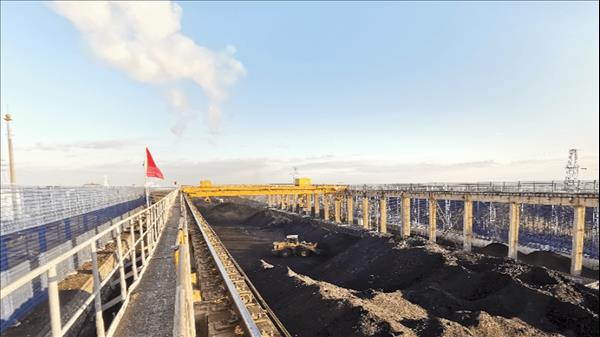
China Gets Burned As Mongolia Breaks Coal Link
China will have to pay more to buy coal from Mongolia, which says it will stop shipping its solid fuel to China directly from February and instead sell it through auctions.
Mongolia will also use border price, instead of pithead price, to sell its coal starting Wednesday, meaning that the new price will include the transportation cost between its coal mines and borders.
The Mongolian government made the decisions after thousands of people stormed the country's capital in December to protest against alleged corruption in the coal industry.
China's foreign ministry has not yet commented on the matter. Several Chinese columnists criticized Mongolia for breaking an agreement with China, which bought 84% of Mongolian coal last year.
In early January, China Energy Investment Corp, a state-owned company, placed an order to import coal from Australia, the world's second-largest coal exporter after Indonesia, Reuters reported.
Since October 2020, Beijing has banned imports of coal from Australia after the Australian government called for an investigation into the Covid-19 outbreaks in China.
In September 2021, China faced a nationwide power crunch as power plants reduced their output due to a sharp rise in regional coal prices. They said they could not make profits under the country's electricity price cap.
The central government set up a task force and spent three months resolving the matter. It ordered coal mines in Inner Mongolia and Shanxi to boost output while allowing electricity prices to increase by 10-20%. It also imported more coal from Mongolia, Russia and Canada.
Mongolia replaced Australia as China's largest supplier of coking coal from 2021. In 2020, China imported about 35 million tons of Australian coking coal, which represented 48% of all its coking coal imports. Last year, China imported 63.83 million tons of coking coal from Mongolia (40%), much of the rest from Russia (33%), Canada (12%) and the United States (7%).
On November 28 last year, Chinese President Xi Jinping and Mongolian President Ukhnaagiin Khürelsükh met in Beijing and signed a series of cooperation agreements. The two countries planned to push forward a long-term agreement that would boost the supply of Mongolian coal to China.
But on December 6, thousands of protesters rallied in Ulaanbaatar's central Sukhbaatar Square, calling for the Mongolian parliament to be dismissed as dozens of legislators and officials were accused of stealing the receivables of Erdenes-Tavantolgoi JSC, the country's largest state-owned coal miner.
Starting from Wednesday, Erdenes-Tavantolgoi will cease signing direct sales contracts with buyers in China but sell its coal through auctions on the Mongolian Stock Exchange.
Prior to this, the Mongolian government said last October that its coal miners would sell their products at border price, instead of pithead price, from February 2023. A ton of coal is priced at US$71 at pithead and US$129 at the border.
A Fujian-based columnist said it was unfair that China had to pay all the costs that were caused by the corruption problems in Mongolia.
He said Mongolia had in a recent auction sold 12,800 tons of coking coal to a Singaporean firm at 1,290 yuan (US$191) per ton, a 12.2% premium over the previous transaction price of 1,150 yuan.
He said using border price would seriously hurt Chinese buyers's interests as Mongolian miners could decide the logistic costs. He said Mongolia's auction system would deter Chinese customers.
“It is not easy to form an energy partnership between China and Mongolia,” wrote a Shandong-based columnist.“But if Mongolia wants to make money from China, it must think deeply before taking any actions.”
He said it was irresponsible for the Mongolian government to unilaterally terminate its energy agreement with China while hoping that China would pay the costs of its anti-graft reform. He said if Mongolia failed to boost energy exports to China, it should think about how to push forward its economic stimulus plan.
A Liaoning-based writer said that although Mongolia was separated from China under the Qing government in 1911, China had kept providing economic benefits to Mongolia.
He said Mongolia should handle its corruption problems in a more pragmatic and prudent way, instead of hurting its tie with China.
He said the sudden change of export rules in Mongolia would disrupt the coal supply to China, which would then turn to buy more coal from Russia, Australia, Indonesia and North Korea.
On December 21, Australian Foreign Minister Penny Wong and Chinese diplomat Wang Yi met in Beijing to discuss how the trade blockages could be removed between the two countries.
Early this month, China lifted its unofficial ban on Australian thermal and coking coal imports, media reported. The first batch of coal will arrive in China in April.
Australian Prime Minister Anthony Albanese said on January 14 that Australia was seeking to fully restore trade ties with China.
read: pipeline politics prominent at sco summit
Follow Jeff Pao on Twitter at @jeffpao3

Legal Disclaimer:
MENAFN provides the information “as is” without warranty of any kind. We do not accept any responsibility or liability for the accuracy, content, images, videos, licenses, completeness, legality, or reliability of the information contained in this article. If you have any complaints or copyright issues related to this article, kindly contact the provider above.






















Comments
No comment